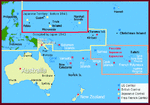Glider
Major
Glider the problem is that the British were hard pressed to keep the convoy escorts in the North Atlantic in 1942, the USA had very little available to help with this job, they could not introduce convoys even if they wanted to. Remember it takes not only ships, (DD, DE, sloops etc) but they needed ASW equipment (Sonar, Hedgehog) and trained crew. Even after Adm. King finally agreed to put in convoys, it still took a few more months to put it all in place. And we are only talking US East Coast Caribbean here. Imagine if the Allies had to do this on the US West coast, the S. Pacific, Indian Ocean, African, Australian ports as well. The alternative is that all the ships would be stuck in port because there is no escort available. (which is what actually happened in summer 1942 on the US East coast)
For example if the last two months of 1941 the Allies lose 4 - 5 million tons worldwide. In January the Allied governments go into crisis mode, but what can they do? The US must continue to supply Hawaii, Australia the outposts at Midway, American Samoa, Tonga, NZ, etc. The British must continue to send supplies to Egypt, Malta, India, Burma, Malaya, Australia others. The US UK might lose another 4 - 5 million tons in the first quarter of 1942.
The "British Import Crisis" in March 1943 resulted after the British lost 5.1 million tons in the first 15 months after Pearl Harbour, but they built only 2.2 million tons in that time. Nevertheless, losing less than 3 million net put us into crisis mode
HyperWar: British War Economy [Chapter XIV]
British Import Crisis
I'm afraid that the loss of so much tonnage would mean abandoning the Far East (Malaya Burma), or Egypt, or even both. With the USA losing so much of its fleet, it would be in no position to help out, as it did historically in 1943
I don't disagree with this and have no doubt that we might have had to give up the far east. The Med no. However in the long run the allies would have won due to their increased production. The USA could have and I believe would have put convoys at the top of their priority. The USN had a large number of destroyers that were used exclusively for 'Fleet' operations and I believe would have been used for convoys.

